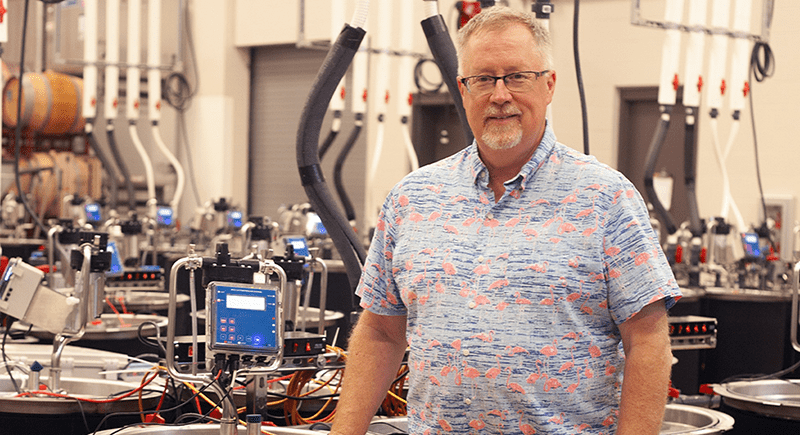
February 24, 2023 WSU’s Tom Collins named innovator of the year by Wine Enthusiast Magazine
A recent increase in wildfire smoke has challenged the wine and grape industry. Tom Collins, assistant professor in Washington State University’s Department of Viticulture & Enology at WSU Tri-Cities, is dedicated to finding a solution.
Collins was recently selected as Wine Enthusiast Magazine’s Innovator of the Year for his influential research on grape smoke exposure mitigation. He received the award alongside colleagues Elizabeth Tomasino of Oregon State University and Anita Oberholster of University of California, Davis.
This honor is part of Wine Enthusiast Magazine’s annual Wine Star Awards, which recognize individuals and companies making exceptional contributions to the wine and alcoholic beverage industries in the U.S. and beyond. The awards are revered as being among the most prestigious in the global wine industry.
“This is the first time I’ve experienced something like this,” said Collins, who is based at the Ste. Michelle Wine Estates WSU Wine Science Center at WSU Tri-Cities. “All three of us were surprised. We’re here because we enjoy the work and believe we can make a difference for the industry. It’s nice to be recognized and know people appreciate our progress.”
The trio and their collaborators developed a coordinated strategy to combat grape smoke exposure on the West Coast. Their work involves feedback from stakeholders in all three states and is part of a four-year project funded by a $7.6 million USDA grant.
Collins’ interest in wine was piqued as an undergraduate at Cornell University. After five years of military service, he enrolled at UC Davis to pursue a degree in the field. A short stint as a winemaker confirmed that he was more drawn to the problem-solving and scientific aspects of winemaking than the day-to-day operations of running a winery.
Collins completed his PhD in Agricultural and Environmental Chemistry at UC Davis in 2012 and accepted his current WSU position in 2015. At the time, he had only visited the Tri-Cities twice, but doesn’t regret the decision to move north.
“People in this industry help each other and provide terrific support to researchers,” Collins said. “This is a great place to be for wine and grape research. I also have a great team of colleagues and students to work with here.”
The complexity of smoke exposure’s effect on grapes has been somewhat unexpected.
“In the beginning, it seemed like we could sort it out fairly quickly,” said Collins. “But we’re still working through the chemistry and trying to understand the compounds responsible for the aromas and flavors and how they influence consumer perception.”
To mimic smoke exposure, Collins and his WSU research team use hoophouses—portable frames with shade cloth covers and firebox smokers. They burn rangeland plants or wood pellets to create smoke, which is sent through plastic pipes to the vineyard, exposing the fruit. They average four or five exposures each year.
When harvest time comes, the team brings the fruit to the WSU Wine Science Center to create wine for mitigation trials. Part of their work involves finding ways to clean up smoke-affected wines and make them usable.
“Detecting smoke-related compounds at lower levels is important because there is a wide range of consumer perception,” Collins said. “We need to be careful to recognize low-level issues before they enter the marketplace. We’re also training the industry to recognize them.”
Some headway has been made with barrier sprays, which can be applied in the vineyard to reduce the amount of uptake from smoke exposure by as much as 60%.
“If we can keep those compounds out of the vines, that’s a great start,” Collins said. “There’s much less to deal with downstream when cleaning the wines up.”
The transition from three independent grape smoke exposure programs to a team effort between states is recent, but Collins emphasizes the importance of collaboration between the universities, which each bring unique specialties to the table.
“This award recognizes that it’s a combined effort,” Collins said. “There are times when we need to work together across universities and state boundaries to find solutions for our industry.”
Previous Innovator of the Year award winners include Coravin, creator of an innovative sparkling wine preservation system; Cory Rellas, co-founder of alcohol delivery service Drizly; and Terry Wheatley, philanthropist and president of Vintage Wine Estates, which operates a family of wineries throughout California, Oregon, and Washington.
By Angela Sams, College of Agricultural, Human, and Natural Resource Sciences




